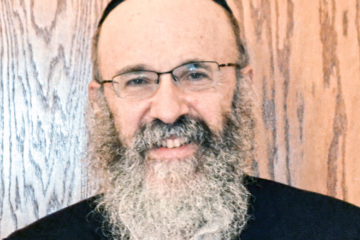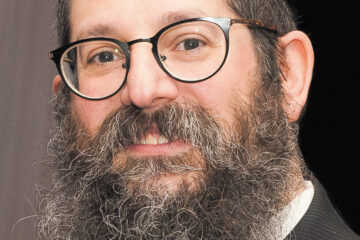Purim, conflict, and sacrifice

By Rabbi Shmuel Klatzkin, Chabad of Greater Dayton
I grew up in a home where the politics was middle-of-the-road, Cold War-consensus Republican. When, as a high-schooler, caught up in the growing disenchantment with the war in Vietnam, my politics veered wildly leftward, it led to some high-heat political debates at home.
At a certain point in one of many thrashings-out on the topic of the war, my father struck a conciliatory note, saying, “I understand one thing clearly. Your generation is being asked to carry the entire burden of the war. During World War II, no one could buy a new car, gasoline was rationed, women’s stockings became hard to get, many foods were rationed. Almost everyone shared the burden in some way, almost everyone was called upon to sacrifice. If we are going to ask you to go to war, we should all be prepared to sacrifice.”
What histories of the Vietnam War show is that America’s defeat came not from any decisive battlefield reverse, but from a loss of political will to fight. A substantial part of the American population doubted the morality or practicality of the war.
And when the Administration completely lost its ability to lead, through Watergate and its aftermath, even North Vietnam’s invasion of the south in cynical violation of the two-year-old Paris Peace Treaty could no longer spark any American will to be involved any further at all. All that was left was for the helicopter to depart from the embassy roof, for the re-education camps to be filled, and for the boat people to begin their sorry journeys to anywhere else.
Whether one looks back at the Vietnam War from a conservative or liberal perspective, the war did show my father’s point to be reasonable — to succeed in a conflict, people must be united and willing to join in the sacrifice that a great cause requires. This holds true whether we are talking about an armed conflict or any other great cause; the philosopher William James famously wrote that the great problems facing civilization can only be addressed by a call to duty that is “the moral equivalent of war.”
It is a principle of the mystics that we learn lessons from the Jewish calendar. But how does Purim fit in with such talk of conflict and sacrifice?
While we often think of Purim as a time of fun, of masquerades, and of a stout l’chayim or two, it also carries a serious message that, strangely enough, addresses the idea that my father broached.
Purim’s back-story, as illuminated in the tradition, is of a struggle for Jewish existence that was fought from the bottom up, not the top down, and which succeeded only because everyone put all their chips on the table and put their own lives at risk.
That risk-taking began with Mordechai, who easily could have deferred to Haman; Jewish law does not forbid bowing to an authority. But how often has it been in our history that human authorities have made gods of themselves?
In that case, there can be no playing along; even at the risk of his own life, Mordechai refused to bow down. We cannot defer to tyrants.
But the heroism of Mordechai alone wasn’t enough, nor was that of Esther.
Before her own act of heroism, Esther asked that all the Jews should gather together and fast, and she would join them. Only then would she be confident that she could succeed in her own heroic act.
The Jews of Persia stood together and followed the leadership of Mordechai and Esther. As we see in the story in the Megillah, there were no open miracles that delivered them. No sea split. No angels came marching on treetops.
No walls miraculously sank in the earth. There was no splitting of heaven, no thunder or lightning or Divine voice.
Instead, the people chose to stand as Jews, no matter what the risk.
Throughout the months after Haman’s decree was made known, the Jews did not fold their tents and disappear. They stayed, they prayed, they resisted, and in the end, they triumphed.
“And these days of Purim are remembered and relived, in every generation, every family, every country, and every city.”
Facing the hatred of today’s Hamans, whether vicious and open, or whether masked with a veneer of respectability and political correctness, our response needs to be the same.
We cannot look to something outside us to save us. The power for our survival and triumph is within, given to us already by God and waiting for us to activate it.
Let us put ourselves on the line and stand up for who we really are as a people. Let us without apology, with courage, dignity and determination, identify and face down the evil that seeks to destroy us. No ally, no weapon, no army can substitute for this.
The Megillah writes of the result of the Jews’ commitment long ago: “The Jews had light and joy, rejoicing and splendor.” So may it be for us!
To read the complete March 2015 Dayton Jewish Observer, click here.




